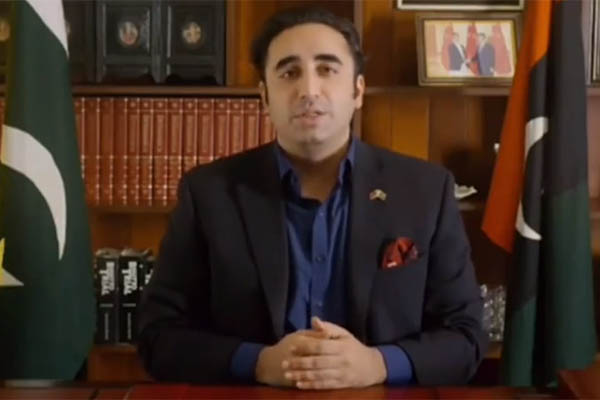
Screengrab of Foreign Minister Bilawal Bhutto-Zardari’s keynote speech
Foreign Minister Bilawal Bhutto-Zardari on Thursday describing disinformation as a “global pandemic,” and urged the international community to agree on a “plan of action” to counter disinformation—both online and offline and in the public and private domains.
In his keynote address—delivered virtually—to the Group of Friends on Countering Disinformation for the Promotion and Protection of Humans, he stressed that the “exponential proliferation” of disinformation, especially through social media, had spread social discord; hate speech; racism; Islamophobia and “exacerbated competing nationalisms and inter-state tensions and conflict.” He warned that “hybrid warfare” inflicted through disinformation was often the “opening salvo of intervention and conflict.”
Recalling that Pakistan and several like-minded countries had pushed the U.N. General Assembly to adopt a “landmark” resolution on “Countering Disinformation for the Promotion and Protection of Human Rights and Fundamental Freedoms,” he said the “Group of Friends” had been established to promote its implementation. “We are grateful to all the countries who have joined the group. They represent all the regions of the world,” he added.
The foreign minister suggested combating disinformation by enhancing public awareness through information campaigns promoted by member states and the U.N. and build societal resistance and resilience against disinformation. “We should enhance the capacity of governments and their relevant institutions to detect, analyze and expose disinformation and disinformation campaigns and networks,” he said, stressing that the U.N. and its agencies should help to build the capacity of member states, “especially developing countries,” to analyze, fact-check and filter information, especially if its available online. “Moreover, financial and technical support should be extended to national and international researchers and institutions which are involved in detecting disinformation,” he added.
“Such a concerted international effort can help to expose and dismantle disinformation networks—some of which have been operating against my country for over 30 years,” he stressed.
The global community, advised Bhutto-Zardari, should cooperate in minimizing the negative impact of disinformation on human rights and relations between communities and states by building firewalls against false information, ensuring transparency, adhering to human rights principles, preventing the propagation of racism, discrimination and hate speech. Artificial intelligence and best practices could be used to achieve this, he said.
The foreign minister said the U.N.’s human rights mechanisms should highlight the negative impact of disinformation on human rights, adding rules, standards and regulations should be established for social media companies. The U.N. should also open a dialogue between member states and all non-governmental stakeholders to develop consensus on “international cooperation” to combat disinformation, he said, concluding his speech.
